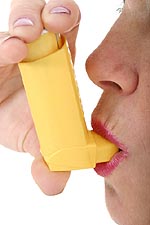Asthma: Symptoms, Allergens
and Treatment

In Greek, asthma literally means 'difficulty breathing.'
Asthma is characterized by inflammation of the lining of the airways of the lungs. The effect of this inflammation is that it causes the narrowing of airways, which reduces the amount of air that can be blown out of the lungs, and the rate at which air can be expelled form the lungs. In addition to this, inflammation causes airways to be hypersensitive to many irritants such as cold air, pollution fumes, aerosols and strong scents. These can trigger the constriction of the irritated airways, giving rise to asthma.
Symptoms
- Shortness of breath: Difficulty breathing, a feeling of tightness in the chest and shortness of breath are the main features or asthma.
- Wheezing: The whistling sound is the result or air being forced through swollen and partially obstructed airways in the lungs.
- Coughing: Night-time coughing characterizes asthma.
- Increased night-time symptoms: All symptoms of asthma worsen during the night. The reason for this is that lung function in everyone is at its lowest at around 4 am and at best at 4 pm. This is due to changes that occur in circulating levels of adrenaline, which is lowest at night. Adrenaline helps to relax the muscles of the bronchi (lung airways), keeping them open.
Nerve impulses slow the heart rate and the activity of intestines when the body shuts down during sleep, but at the same time causes minor narrowing in the bronchi. The influence is inflated in people with asthma, making their symptoms and lung function worse at night.
Allergens
- Dust mites
- Pets
- Mould
- Air pollution
- Certain foods (such as milk)
Treatment
- Minimize exposure to allergens:
- Reduce moisture and damp
- Prevent build-up of dust
- Wash bed linen at high temperatures to kill dust mites
- Wherever possible, replace carpets with tiles
- Give pets frequent baths
- Medication:
- Use bronchodilators if asthma is infrequent
- Use anti-allergic medicine
- Corticosteroid inhalers are effective when taken regularly
|